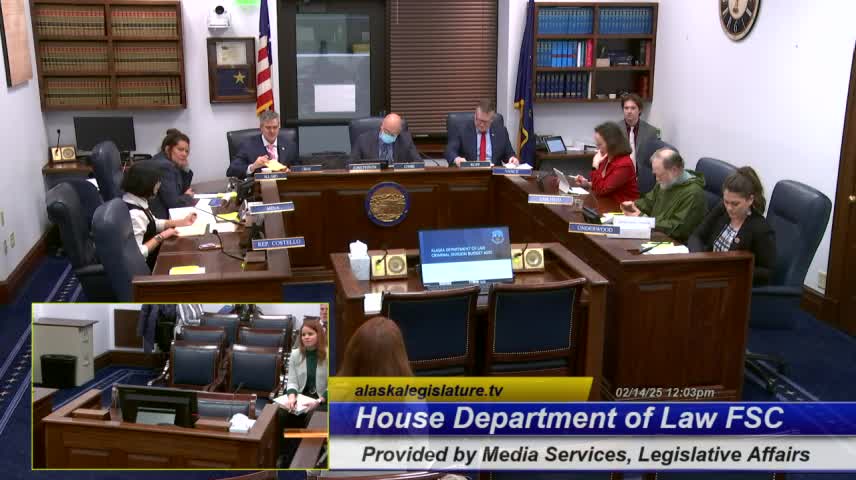Alaska Criminal Division asks legislators for prosecutors, Brady and post-conviction specialists in FY26 budget pitch
Get AI-powered insights, summaries, and transcripts
Subscribe
Summary
Director Angie Kemp told the House Law Finance Subcommittee Feb. 14 that delays, growing digital discovery and inexperienced prosecutors are lengthening case timelines and that the division seeks new attorney and support positions, including a dedicated Brady prosecutor and post-conviction relief attorney.
Angie Kemp, director of the Criminal Division at the Alaska Department of Law, told the House Law Finance Subcommittee on Feb. 14 that the division is asking the Legislature for additional prosecutors and support staff in its FY26 budget because long case timelines, expanding digital discovery and an inexperienced workforce are straining prosecutions statewide.
Kemp told the panel she is requesting caseload-reduction hires—three prosecutors, one paralegal and a law office assistant targeted to Dillingham, Palmer and Sitka (with a planned Southeast workload adjustment involving Ketchikan and Sitka)—plus a senior Brady prosecutor to manage impeachment and personnel-file disclosures and a post-conviction relief attorney with a law assistant to handle complex PCR litigation. "For the record, my name is Angie Kemp. I'm the director for the criminal division with the Department of Law," Kemp said when she opened the presentation.
Kemp outlined three core problems shaping the budget requests: time to disposition, expanding discovery obligations and high caseloads combined with an inexperienced workforce. She described average times to resolution from the division's case-management data: misdemeanors typically take "1 to 1 and a half years," felonies "2 to 3 years," and appeals "3 to 5 years." Kemp warned those delays can weaken prosecutions: "justice delayed is justice denied," she said, and noted victims and witnesses may move away, decline to testify or die while cases remain open.
Discovery demands have surged with the rollout of body-worn cameras, Kemp told lawmakers. She used data from Alaska State Troopers locations in Palmer and Fairbanks to show sharp increases in stored media measured in gigabytes, and said prosecutors and paralegals must marshal and review that material. The division also faces an expanded workload tied to Brady and Giglio obligations—the obligation to disclose impeachment material about witnesses, including potentially sensitive personnel records for law-enforcement or child-protection workers. Kemp described an existing system that relies on senior attorneys acting as liaisons and said the division wants a dedicated Brady prosecutor to manage approximately 400 active "alerts" tied to personnel files and other impeachment material.
Kemp said high caseloads and an inexperienced applicant pool are compounding delays. The division is aiming for per-prosecutor caseloads between 85 and 100 cases, she said, and singled out the Matanuska-Susitna Borough (MATSU/Palmer) and several rural offices for relief. Kemp described Anchorage's largest office as having 37 prosecutors and said the division hired 12 prosecutors in FY25, "11 have little to no prosecution experience." She said the statewide vacancy log showed 23 open attorney PCNs by the OMB "butts-in-seats" accounting at the time of her presentation and that the division was actively recruiting for six attorney positions and two paralegals.
On post-conviction relief (PCR) work, Kemp told the committee the division currently has about 376 outstanding PCR applications and that such cases can involve decades-old records and complex hybrid civil-criminal procedure. "Post conviction relief is the procedure that would follow potentially an appeal," she said, explaining that defendants can allege ineffective assistance of counsel or request DNA testing. Kemp asked for a dedicated attorney and law assistant to handle the most complex PCR matters and to train line prosecutors.
Lawmakers pressed Kemp on specifics throughout the hearing. Representative Gray asked whether the division reports average or median times to disposition; Kemp said the division's figures were averages and that court data she had reviewed showed similar median results. Representative Allard and others questioned vacancy patterns and whether PCNs had been lingering; Kemp said some vacancies are recent and that recruiting for rural locations such as Bethel and Utqiagvik is particularly difficult. Kemp said telework is limited and "very few of our employees telework," describing in-person office and courtroom presence as important for mentoring and training.
Kemp also described recruitment efforts and earlier budget investments. She said the Legislature funded a paid internship program last year and that the division has expanded internships to most offices in Alaska; the stipend is intended to help with housing and travel. She noted partnerships with law schools and a potential Seattle University presence at the University of Alaska Anchorage as ways to encourage Alaska students to return.
There were no formal votes on the requests during the Feb. 14 hearing. Chair Josephson closed the meeting after scheduling follow-up hearings on the governor's FY26 budget amendments for the following week and adjourned at 1:18 p.m.
Ending: The subcommittee will consider the governor's FY26 amendments at its next scheduled meeting; Kemp's budget requests will be part of that ongoing review and appropriation process.
